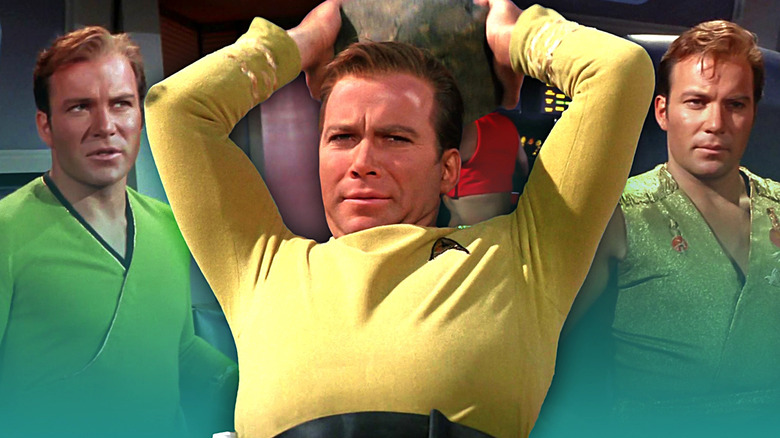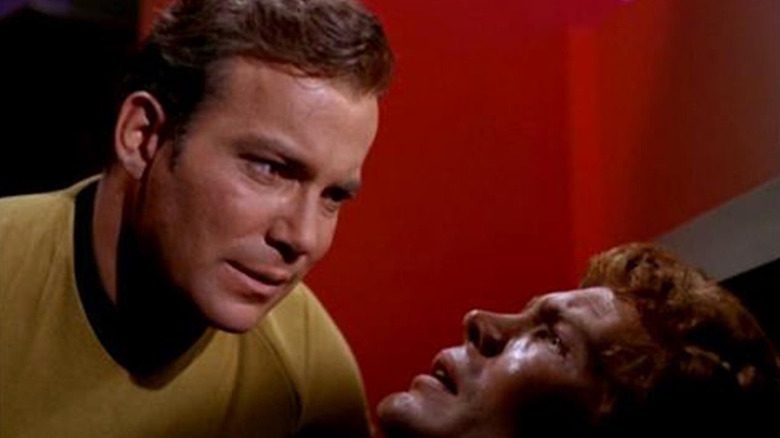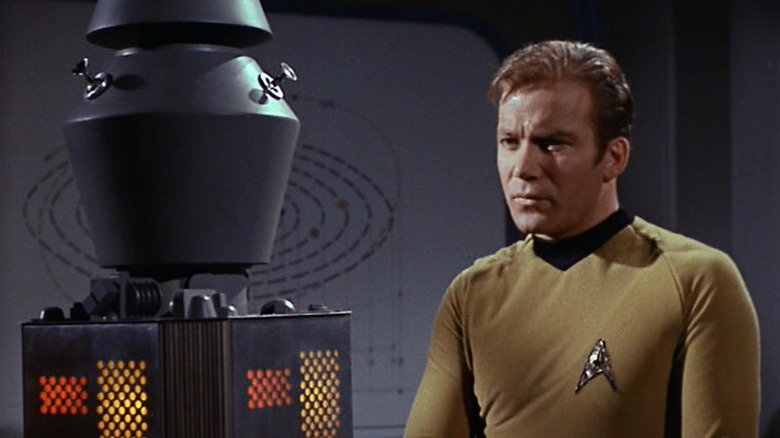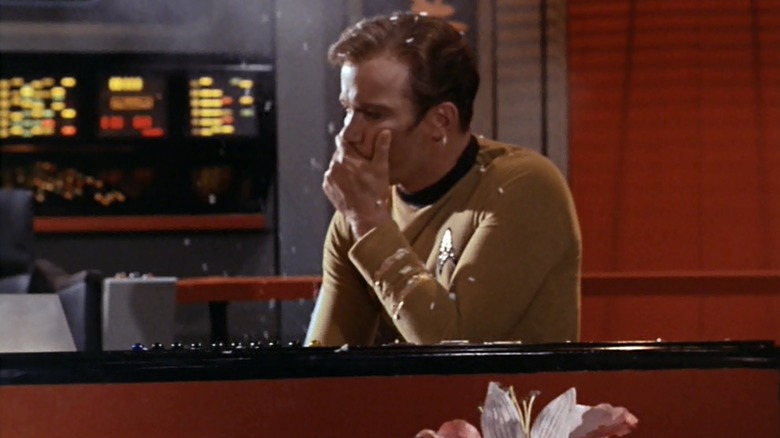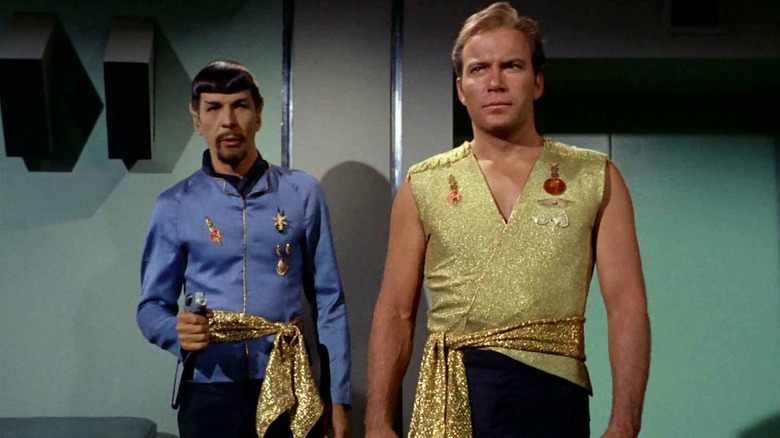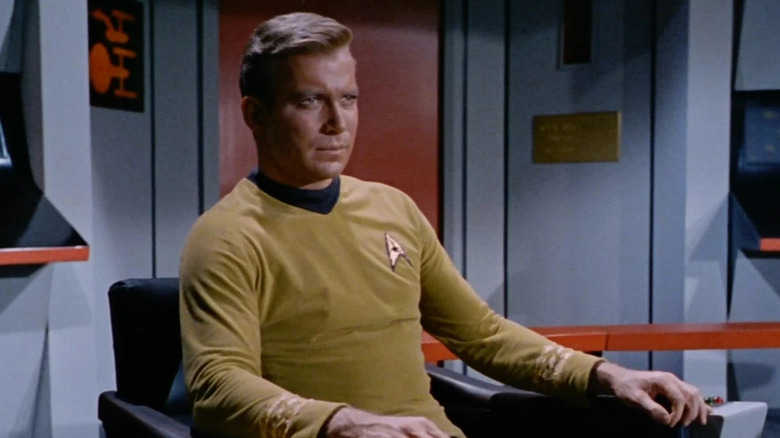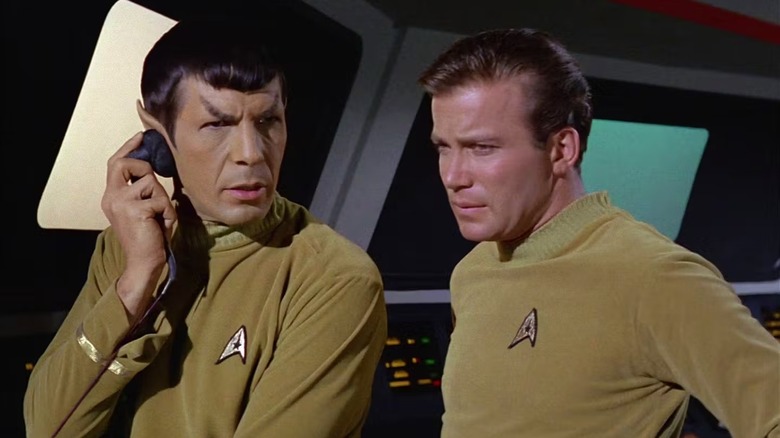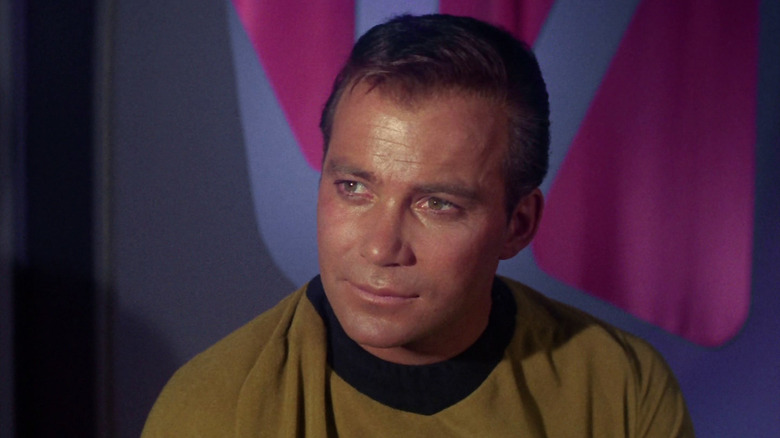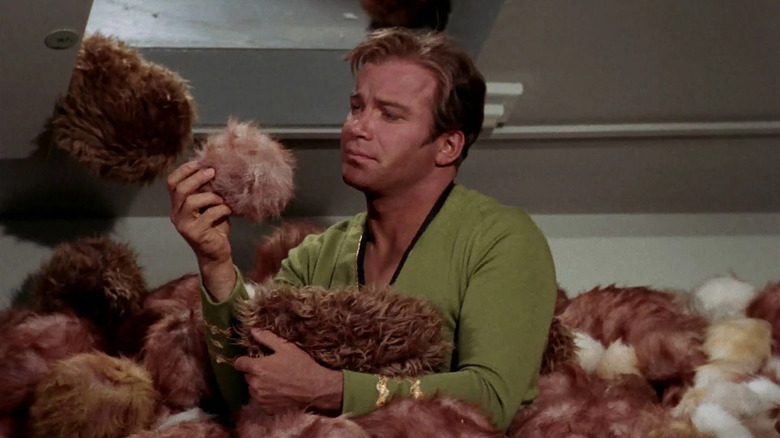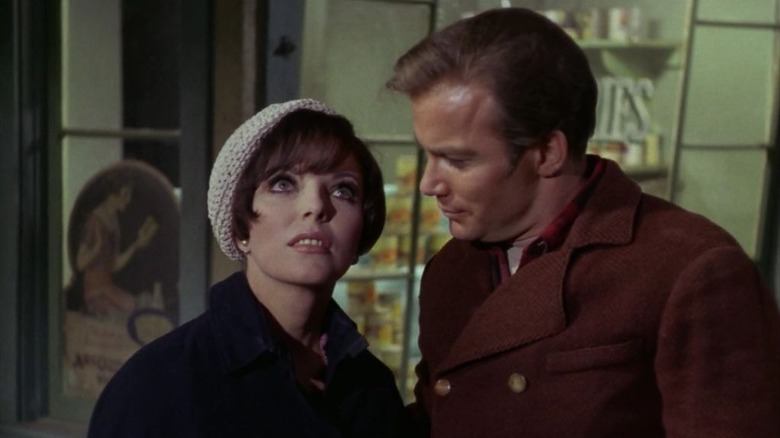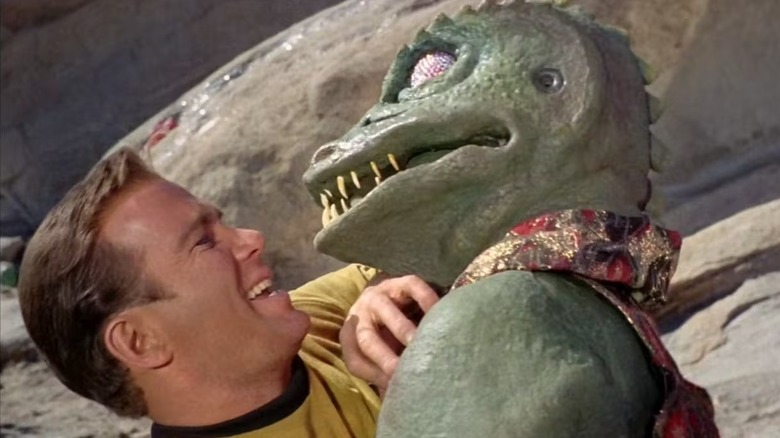Star Trek's 10 Best James T. Kirk Episodes, Ranked
One of the most enduring heroes in all of science fiction is James Tiberius Kirk, protagonist of "Star Trek: The Original Series" and its accompanying films. Iconically played by William Shatner for much of the character's history, Kirk's legacy has spread into subsequent "Star Trek" shows and movies. While actors like "Star Trek" 2009's Chris Pine and "Star Trek: Discovery" cast member Paul Wesley have provided their own modern depictions of Kirk, Shatner's confidently assured captain is still the gold standard for the character. As the captain of the USS Enterprise, Kirk leads his crew to explore the galaxy and spread the United Federation of Planets' ethos of peaceful coexistence.
For the foundations of what makes Kirk such an effective sci-fi character, there are plenty of "TOS" episodes highlighting his qualities and Shatner's performance. These range from showing the more action-ready side of the venerable Starfleet officer to his more vulnerable and compassionate moments. Here are James T. Kirk's 10 best "Star Trek" episodes, all from "The Original Series."
Obsession
"TOS" episodes like "The Conscience of the King" reveal that Kirk came from a turbulent background prior to captaining the Enterprise. The second season episode "Obsession" unveils a traumatic incident from Kirk's Starfleet history that resurfaces to haunt him years later. While surveying a remote planet, the crew is attacked by a gaseous creature that completely drains anyone it envelopes of their blood. As Kirk pursues this monster, Doctor McCoy (DeForest Kelley) and Spock (Leonard Nimoy) learn Kirk faced this entity earlier in his Starfleet career.
"Obsession" is Kirk at his rawest, at least without him going out of control from external influences. The audience learns more about Kirk's backstory in Starfleet as he becomes increasingly driven to finish off the monster that menaced him as a younger officer. It's through his friends that Kirk's narrow-minded vendetta is tempered, with clearer heads eventually prevailing. A great Kirk-focused episode, "Obsession" brings guilt and unresolved trauma to the forefront as Kirk battles his ethereal ghost from the past.
The Changeling
A number of "TOS" episodes involve the danger of coldly lethal artificial intelligence, with the standout being the second season episode "The Changeling." The Enterprise encounters a sentient probe known as Nomad (Vic Perrin) that has wiped out a nearby star system. After Kirk identifies himself, Nomad ceases its attacks and boards the ship, mistaking Kirk for its 21st century creator. Damaged during its long journey from Earth, Nomad's mission parameters were altered to it believing it should wipe out all imperfect life in the universe.
There are a lot of absolutely wild things that take place throughout "The Changeling" when looking at the episode at first glance. This includes the Enterprise's chief engineer Scotty (James Doohan) being temporarily killed and communications officer Uhura (Nichelle Nichols) having her memories erased. What grounds the whole episode is Kirk and Spock trying to reason with Nomad, with Kirk taking advantage of its mistaken identification of him. To see Kirk outreason a machine instead of Spock is a nice twist, with the usual action-oriented hero trapping Nomad in a logic puzzle to save the day.
This Side of Paradise
Kirk's relationship with the Enterprise is arguably just as important to him as it is with any single person in his crew. This dynamic is put to the test in the first season episode "This Side of Paradise," with the Enterprise visiting a distant colony endangered by the planet's radiation. As the crew investigates, they are exposed to spores that leave them docile and unwilling to leave the planet, with even Spock among the infected. As the spores spread to the Enterprise, Kirk finds himself the last person on board trying to recover his crew and the colonists from the planet.
Seeing Kirk become increasingly bewildered and frustrated as he loses his crew to the spores is a sight in itself, especially as they unassumingly agree that they're committing mutiny. However, it's the scenes when Kirk is all alone on a deserted Enterprise that he's at his best. Kirk overcoming his own exposure to the spores through sheer willpower and his dedication to the Enterprise is a standout moment for Shatner as the character. "This Side of Paradise" gives Kirk and Spock each interesting new depths of their characters, showcasing Kirk's love for the Enterprise, in particular.
Mirror, Mirror
The morally inverted Mirror Universe is a recurring "Star Trek" trope, ever since it was introduced in the "TOS" second season episode "Mirror, Mirror." A transporter malfunction sends Kirk and the rest of his landing party to the Mirror Universe, where the Federation is replaced by the brutally militaristic Terran Empire. As Kirk and his displaced crew try to find a way to return home, he learns that officers in the Empire climb the chain of command by assassinating their superiors. With Kirk's change in behavior noticed by the Mirror Enterprise, he must act fast as those vying for his command perceive this as an opportunity to strike.
While Shatner had played an evil Kirk before, in the first season episode "The Enemy Within," he gives a more subtle and nuanced performance in "Mirror, Mirror." Apart from a brief glimpse of the true Mirror Kirk, the Kirk that we all know and love has to outwardly appear as his cruel counterpart in the Mirror Universe. This gives Shatner interesting dimensions to take his performance, culminating in Kirk trying to inspire Mirror Spock to do better than his universe demands. The Mirror Universe is a popular "Star Trek" hallmark, and Shatner clearly enjoys playing in this variation of the Enterprise and its crew.
Balance of Terror
Though the Enterprise is primarily on an exploratory scientific mission, it does regularly find itself in military engagements as an extension of Starfleet. The first season episode "Balance of Terror" exemplifies this commitment, as well as introducing the adversarial Romulans into the franchise. While investigating Starfleet outposts along the Romulan border being attacked by an unseen enemy, the Enterprise discovers their enemies have developed cloaking technology. Kirk commands the Enterprise to destroy the prototype Romulan vessel before it can report its effectiveness against the Federation.
Given the episode's premise, making the Romulans a largely invisible enemy, "Balance of Terror" plays out like a spacefaring game of cat-and-mouse. Shatner plays Kirk as focused and driven, but not necessarily recklessly obsessive, as he squares off against the Romulan commander (Mark Lenard). Despite being primarily set on the Enterprise bridge, "Balance of Terror" is tautly paced and one of the best episodes of "TOS." Seated firmly in the captain's chair, it's Kirk's leadership in the face of the enemy that keeps this episode so riveting.
Where No Man Has Gone Before
The second pilot produced for "Star Trek" leading to its pickup for a full series, "Where No Man Has Gone Before" feels quite different from the episodes that followed. One constant at the core of the episode is the dynamic between Kirk and Spock, as the Enterprise endures backlash from strange cosmic energy. This encounter causes two crew members to develop god-like abilities, one being Kirk's old friend and ship helmsman Gary Mitchell (Gary Lockwood). As Mitchell grows murderously unstable from his burgeoning powers, it becomes clear Kirk must put down his longtime buddy.
Right from the very first scene, Kirk's friendship with Spock takes the focus before the escalating stakes come into play. This helps ground the character, along with the agonizing decision he has to make regarding what he does with the increasingly dangerous Mitchell. One amusing Kirk factoid from the episode is that it provides him with a different middle initial, naming him James R. Kirk, before changing it for subsequent episodes. Understandable inconsistencies aside, "Where No Man Has Gone Before" lays a solid foundation for the franchise and its lead character.
The Corbomite Maneuver
The first episode of "Star Trek" produced after its pickup by the network, "The Corbomite Maneuver" quickly proves that it's not like its contemporary sci-fi counterparts. The Enterprise is forced to destroy a tracking probe when it begins emitting harmful radiation and refuses to move away from the ship. This triggers a much larger vessel to confront the Enterprise, with its commander declaring it will destroy Kirk's starship in retaliation. Unable to evade this new opponent, Kirk has to think fast on how to defuse the showdown with minimal hostilities.
Kirk presents himself as a thinking person's captain, avoiding use of outright violence until peaceful solutions are no longer possible. Though "Star Trek" has often employed a chess motif with its strategic gamesmanship, "The Corbomite Maneuver" utilizes something more poker-oriented. Kirk is essentially out-bluffing his opponent when he realizes he's holding the weaker hand, with Shatner delivering on that resourcefulness. Kirk would show this side of himself multiple times but never distilled quite as succinctly as in "The Corbomite Maneuver."
The Trouble with Tribbles
As "TOS" began to grow more confident in its own voice and with its cast, it began to feature more humorous stories sporadically throughout its run. The best of the more comedic episodes is the second season story "The Trouble with Tribbles." The Enterprise is called to ensure a critical grain shipment is sent to Federation colonies from its intermediary storage at a Starfleet space station. This is complicated by the sudden appearance of the Klingons and the strangely adorable — and rapidly multiplying — pests known as the Tribbles.
There is something inherently charming about the more light-hearted "TOS" episodes and "The Trouble with Tribbles" takes full advantage of that. What makes it particularly effective in its comedy is that its humor is present but not as visibly overt as in "I, Mudd" or "A Piece of the Action." "The Trouble with Tribbles" is more subtle and its characters more grounded, including Kirk, whose frustrations with this assignment and its nuances steadily mount. Shatner would get to explore the funny side of "Star Trek" more often, but the way he downplays it here is especially good.
The City on the Edge of Forever
As something of a ladies' man, Kirk has many interstellar romances over the course of "TOS," but none have the same impact as Edith Keeler (Joan Collins). This ill-fated love story is the emotional centerpiece of the first season episode "The City on the Edge of Forever." Kirk and Spock travel back to the 1930s to prevent McCoy from inadvertently altering history as they know it. This leads Kirk to meet and fall in love with Keeler, only to realize she must die for the timeline to be completely restored.
"The City on the Edge of Forever" is widely and rightfully recognized as one of the best "Star Trek" episodes of all time. The marked maturity of its storytelling and inherent tragedy to its core premise make for a timeless sci-fi story, regardless of it being part of "Star Trek." The entire episode only works if the audience believes in the love between Kirk and Keeler, something Shatner and Collins deliver on. As far as sheer emotion, Shatner was never better on "TOS" than he was in "The City on the Edge of Forever."
Arena
So much Starfleet captaining takes place from the relative safety of a starship bridge, whereas the first season episode "Arena" places Kirk in the thick of the action. After walking into a Gorn ambush at a border starbase, Kirk determinedly pursues the attackers with the intent to destroy them. This chase leads them to the omnipotent Metrons, who whisk Kirk and the Gorn captain to a desolate planet to fight to the death and settle their differences. Physically overpowered by the reptilian Gorn and cut off from the Enterprise, Kirk has to think quickly how to survive this duel.
"Arena" captures so many different facets of what makes James T. Kirk such an enduring and effective character. Shatner gets to play Kirk as the battlefield leader, the vengeful captain, the outmatched survivalist, and, ultimately, someone capable of mercy and compassion all in this episode. Watching Kirk think up new strategies to combat the Gorn, culminating in his triumphant, chemistry-based tactic is a lo-fi joy. "Arena" focuses much of its runtime solely on Kirk, and Shatner makes the most of being center stage in this enormously entertaining episode.
